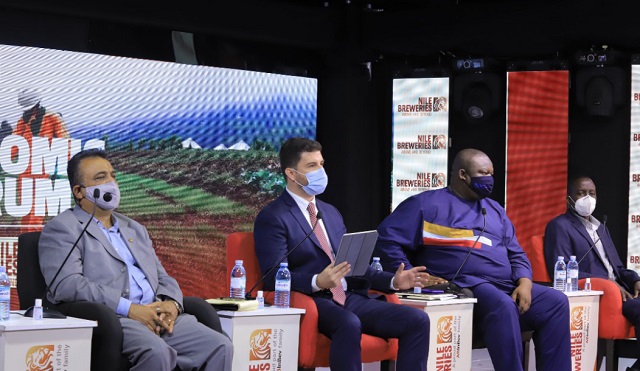
Minister Kasaija promises more government support to boost private sector growth
Kampala, Uganda | JULIUS BUSINGE | Nile Breweries Limited, a subsidiary of the Belgium based ABInBev, on Aug. 18 held a virtual Economic Forum to highlight the company’s contribution to Uganda’s economy, bringing to light the effect of the tax regime on their operation and the generally the beer industry.
Basing on rather old statistics of 2019, ABInBev Director for Uganda, David Valencia, said the company’s monetary value of goods and services that were produced in the country, minus the costs of all inputs and raw materials that are directly attributable to that production, commonly known as Gross Value Added stood at 595bn. This, he said, is equivalent to 23% of the country’s mining and quarrying industry’s gross value added.
He said ABInBev also supported 15,842 jobs through the direct, indirect and induced impacts as well as Shs401 billion in total tax payments or 2.4% of the country’s total tax revenue.
Similarly, there were about 16, 100 retail outlets associated with the distribution of ABInBev’s alcoholic beverages, of which only 4% is classified as being formal. Each of the 96% informal retail outlets had at least an employee or an assistant, creating an additional 24,264 informal retail jobs.
However, in terms of the company’s procurement, financial and business services (37%) and agricultural (19%) sectors took the biggest share.
Valencia said ABInBev spent about Shs250 billion to procure inputs from suppliers across Uganda, including about Shs52billion for agricultural inputs from local farmers.
“The company’s support for the agricultural sector goes beyond procurement as it also supports farmers at lower levels of the agricultural value chain,” Valencia said, adding that ABInBev intends to continue with its Agricultural Development Framework, outlining various medium-term interventions to impact communities and the economy in general.
COVID-19 tax risks
According to Valencia, fiscal pressure and economic headwinds stemming from the Covid-19 shock raise the likelihood of the excise exemptions on beer produced from local inputs being abolished. NBL accounts for about 58% of Uganda’s beer sector.
Valencia said a study conducted by the company recently examined the loss in AB InBev’s economic contribution, in terms of gross value added contribution to GDP, employment and tax revenue, as a result of a waiver in the excise exemption on beer produced from local inputs (beer produced using barley and malted in Uganda and those whose local raw material content, excluding water is at least 75%).
Based on the estimated changes in the average price, volumes and sales of AB InBev’s beers in Uganda due to the waiver on excise exemptions, he said, the loss in terms of the company’s gross value added contribution to GDP could range between Shs54.7 billion and Shs122.7 billion.
The related loss in AB InBev’s contribution to jobs is estimated at between 2,336 and 5,239 while tax revenues could decline by between Shs66billion and Shs147billion.
Digital stamps pressure
Valencia said, the industry is already under pressure and risks are rising partly as a result of the implementation of Digital Tax Stamps (DTS). He said this has led to a surge in beer prices at the time household incomes are now under strain.
Industry experts say, the rise in licit prices could also incentivise an increase in illicit activity, forcing consumers to shift to the already widespread cheaper opaque illicit alcohol.
But the Uganda Revenue Authority’s John Tinka Katungwensi, supports the idea of incentivising manufacturers.
“There is need for government to explore incentivising manufacturers using local ingredients and look into reducing the cost of doing business and finance. This will stimulate jobs, aggregate demand leading to even higher tax revenue,” he said.
Sanjay Tanna, the CEO for Tanna Distributors, said the government should practically implement the credit relief programme to support businesses hit by COVID-19. He said this will also save jobs.
Development Economist, Fred Muhumuza, said NBL’s 2019 figures gives an indication that the company is positively impacting the economy. He, however, said the company should have given out the latest figures.
He said, current management changes at the ministry of finance that show the appointment of Ramathan Ggoobi, as Secretary to the Treasury is likely to influence changes in tax policies and to speak to the economics that works.
Finance Minister, Matia Kasaija, said the government will continue to put in place an environment that supports the growth of private sector since they do a lot to support the economy.
****
 The Independent Uganda: You get the Truth we Pay the Price
The Independent Uganda: You get the Truth we Pay the Price


